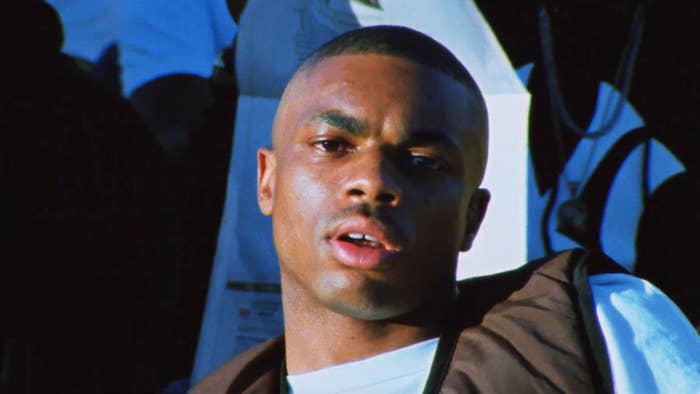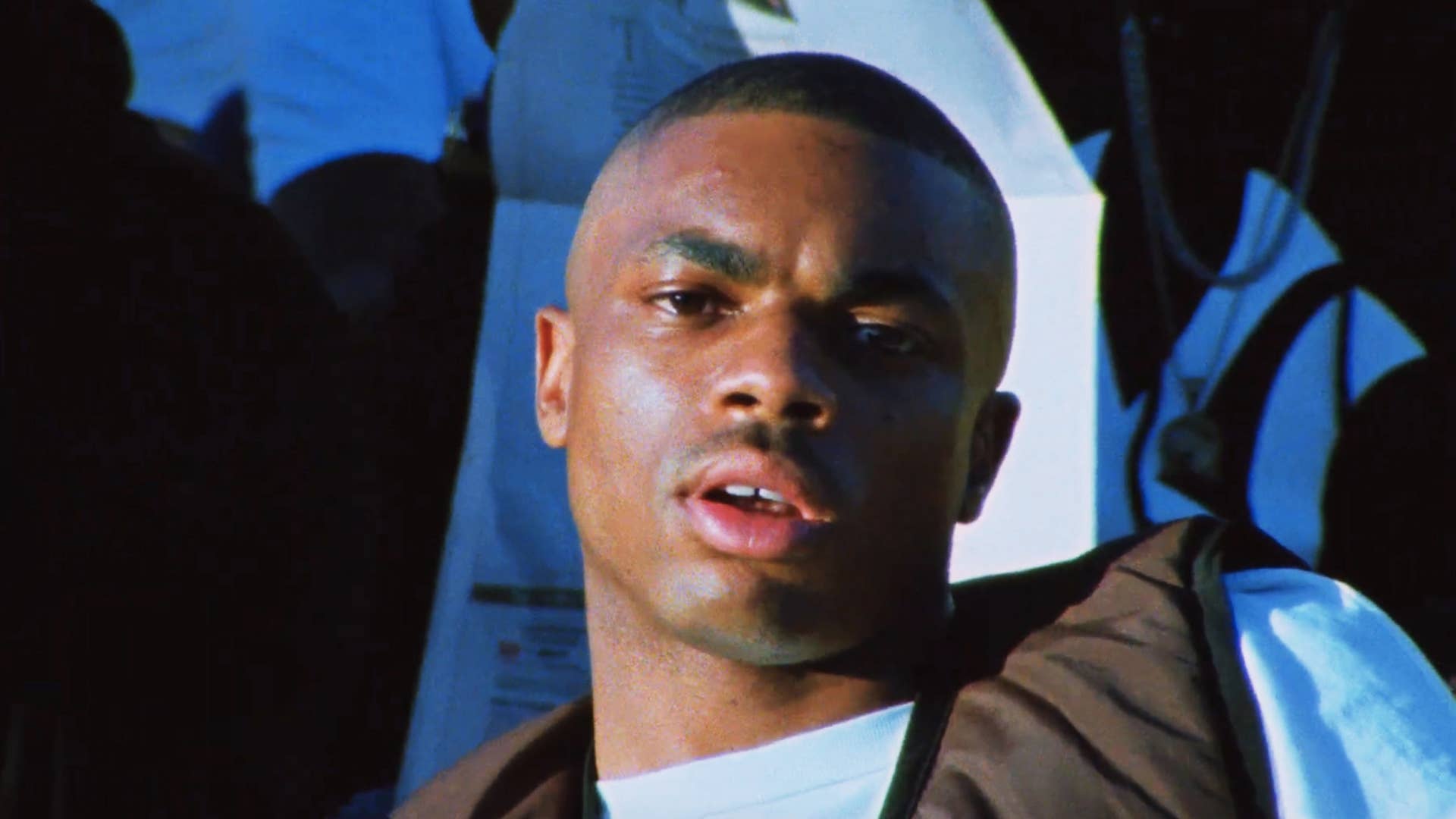
Vince is back.
Three years after the release of FM!, he has returned with Vince Staples, a self-titled album executive produced by Kenny Beats. Outside of guest vocals from Fousheé on “Take Me Home,” there aren’t any features on the 10-song project. This is all Vince, and he takes the opportunity to get personal.
In a press release, Vince explained the thinking behind the album. “This project really gives much more information about me that wasn’t out there before,” he said. “That’s why I went with that title. I feel like I’ve been trying to tell the same story. As you go on in life, your point of view changes. This is another take on myself that I might not have had before.”
So, did he accomplish his goal? What’s the best song? Biggest surprise? Worst thing about the album? Best thing about the album? Members of the Complex Music team (Eric Skelton, Andre Gee, and Jessica McKinney) answered those questions and more after a couple of initial spins. Here are our first impressions of Vince Staples’ new self-titled album.
Eric: “Mhm” ends the album on a perfect note. It has a nice bounce to it, Vince’s hums are catchy as hell, and it ties together all the storylines and themes of the project. On an album full of low-key songs, this one stands out as the first song you’ll want to play in the car.
Andre: “Take Me Home” is the one for me. The album is based on a suite of autobiographical tracks, and this veritable chapter was the most poignant. I thought it was going to be a relationship-based track with the line about wiping tears, then the “I don’t wanna rebound/ I just wanna sleep sound don’t wanna dream ‘bout the shit I done did” line struck me as an interesting flourish to a song like that. Then he just kept it introspective and focused on his relationship with home. The second verse in particular was well-crafted, especially the way he told such a universal story but kept it fresh with his flow. This part stood out to me: “I’m the only one who made it out—you remember me? Is you a friend of me? You plan on killin’ me?” The way he encapsulated such a relevant, powerful idea in just a couple of bars that also sounded good cadence-wise is the mesh of style and substance that rap is all about.
Jessica: “Are You With That?” or “Mhm.” It’s rare that the first and last tracks on an album are the strongest, but Vince was able to pull it off here. “Are You With That?” is great because it’s one of the more personal tracks on the album, and “Mhm” is more of an uptempo banger you’d play out the trunk of your car.
Eric: There are only 10 songs on this thing (including a couple of interludes) which gives Vince an advantage in this category. On first listen, there aren’t any obvious skips. Rappers who keep dropping 20-song projects, take note. This is the benefit of making concise albums—every song plays a role and there isn’t any fat to trim. This thing doesn’t have any big obvious radio hits on it, but there also aren’t any clear low points.
Andre: No skips for me. This is a strong project top to bottom. Vince knows how to put together a concise project.
Jessica: It feels almost wrong to select a track to skip since it’s such a short album and the transitions sound so effortless. “The Shining” sounds the most monotonous to me, though. It’s less interesting than some of the records that offer better storytelling or fun production.
Eric: Vince’s songwriting. He’s always been great at writing raps and putting songs together, but sometimes the production was so big and powerful that it made it easy to miss what he was really saying. Not this time. The stripped-back beats put Vince’s words front and center, and he delivers some of the most personal (and well-written) verses of his career so far. The intro (“Are You With That?”) sets the tone in those respects, and he doesn’t let up for the rest of the album.
Andre: I appreciate what Vince brings to so-called “gangster rap” or whatever you want to call it. He has a knack for poetic brevity and offers a sobering clarity on just what that lifestyle is. A lot of the genre’s offerings are ratcheted up to the highest decibel to tell the most thrilling story, but he’s too weathered to tell anything but the truest story. Consider the “It’s not what you think/thought” bars on “The Shining,” where he raps, “We dyin’ broke and die with broken hearts.” Or where he kills a sacred cow on “Taking Trips,” rapping, “I hate July, crime is high, the summer sucks.” That idea has been conveyed before, but there’s no pretense when he does it. There’s no braggadocio or chest-thumping about being from a tough environment, just a matter-of-fact reflection that there’s always a dark cloud, even at the beach. Some of the best storytelling highlights how we navigate our mundanities. What’s “normal” to us? How do we feel about it? And what does that say about our existence? The most impactful moments on this album are unadorned expressions of violence, grief, and fear, where he doesn’t have to explicitly say, “This life ain’t it,” because you’re already immersed in the dread and melancholy.
Jessica: I like the length of this project. Ten songs is concise and just enough to keep us happy without leaving us with too much to digest. The transitions from tracks to skits are also done very well. Vince does a great job of not attempting too many things on this project. He’s not following trends or experimenting with sounds that don’t fit his aesthetic. He’s not being anything he isn’t. When an artist remains authentic despite what the majority is doing, that’s always a good thing.
Eric: If you go into this album expecting to hear a bunch of bangers, you might be disappointed. It’s clear that’s not what Vince was going for this time, though. After FM! and Big Fish Theory, which were each full of hard-hitting beats and high-energy raps, he slowed things down for a much more introspective and low-key record. This isn’t a bad thing at all (I think Vince and Kenny pull it off really well) but it might throw some people off upon first listen.
Andre: This is definitely me nitpicking, but I’d say even though it has a strong soundscape, there’s not necessarily that one beat that blew me away on first listen. I guess that could be difficult to achieve with Vince’s approach (storytelling over beats that encourage listening) but that is one takeaway I had.
Jessica: The album felt a little redundant at times. There was very little variation in production, on top of the fact that Vince Staples maintains the same tone throughout the 10 tracks. It was difficult to differentiate between each song because everything sounded so similar. For some people, especially Day 1 fans, this may not have been a problem, but having some variation would make for a better listen.
Eric: I’m surprised by how melodic and low-key this is. When I think of Vince Staples, I think of his voice piercing through hard-hitting production, but he went another direction this time. He and Kenny opted for melodic, pitch-shifted hooks and vocal samples instead of big electronic drops. And even when Vince is rapping on songs like “Take Me Home” or “The Shining,” he delivers it all in a really melodic way. This feels like the kind of album you could play on a Sunday morning while you’re making breakfast—a shift from some of his past albums, which were full of Friday night records.
Andre: I don’t know if there was a major surprise for me here. We know what Vince does, what he brings to the table, and that’s what he gave us here. Anything different would’ve been the surprise.
Jessica: There weren’t any.
Eric: I really like this album. It feels like a project that was recorded in quarantine, and I mean that in the most complimentary way possible. Vince took advantage of the isolation and downtime to get reflective, play around with more soothing production than he has in the past, and write some of the most personal songs of his career. He’s always had a way of showing us a new side of himself with each project, and he did it again here. I can already tell I’ll be coming back to this album a lot this year. It’s already in my top 5 rap albums of the year, and might go higher with more listens.
Andre: The first time I played the album, I listened to it while thinking about the interview where Vince said SAINt JHN basically told him to make listeners feel good, and that it gave him a reminder to simplify his process. I’d say this album definitely fit SAINt JHN’s suggestion to take a listener somewhere, but it wasn’t an idyllic place. The sonics were lush, but the stories Vince told were grim. It was a strong, concise project where Vince expressed where he’s at in life, where he’s “rich cuz,” and that’s both a marker of success and what puts him in the crosshairs. The project is really a strong glimpse of the trouble Black people have with the idea of home. For too many of us, our neighborhood is the place that corrupted us and resents us, but still has a hold on us. If it’s not gentrification taking our home, it’s the reality that doing too good makes it so you have to be wary about going back. And as he expressed on this album, the regretful things you do there will even follow you into your dreams. The themes this album explores really make you think about where, if anywhere, Black people can just be, worry-free.
Jessica: I genuinely don’t know how to feel about this album yet. I don’t think it is terrible. Everything sounds nice, and it definitely brings a cool new energy to this year’s releases—especially since we’ve received a handful of records from Southern and Midwestern artists. Its biggest fault, though, is that it’s pretty redundant and fails to offer much that’s new and exciting. It also could have benefited from better beat selection, in my opinion. I feel like his freestyle on LA Leakers was more intriguing, but when it came to the album, he didn’t deliver all the way.

